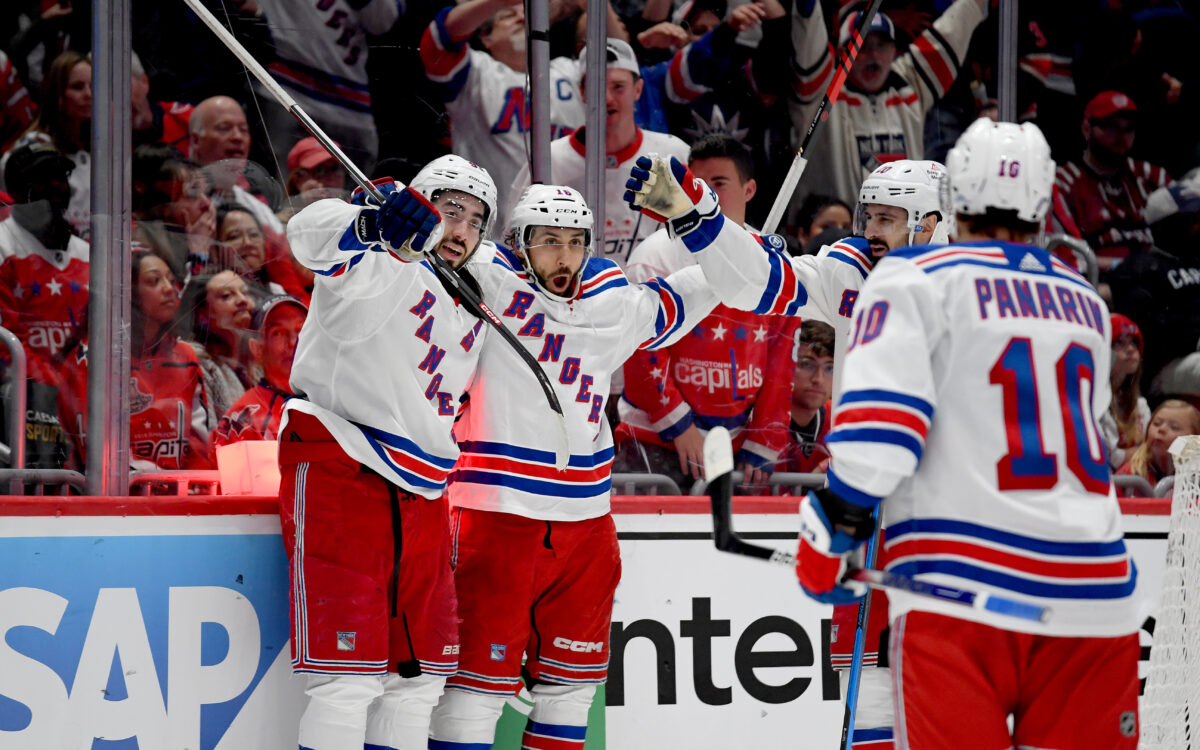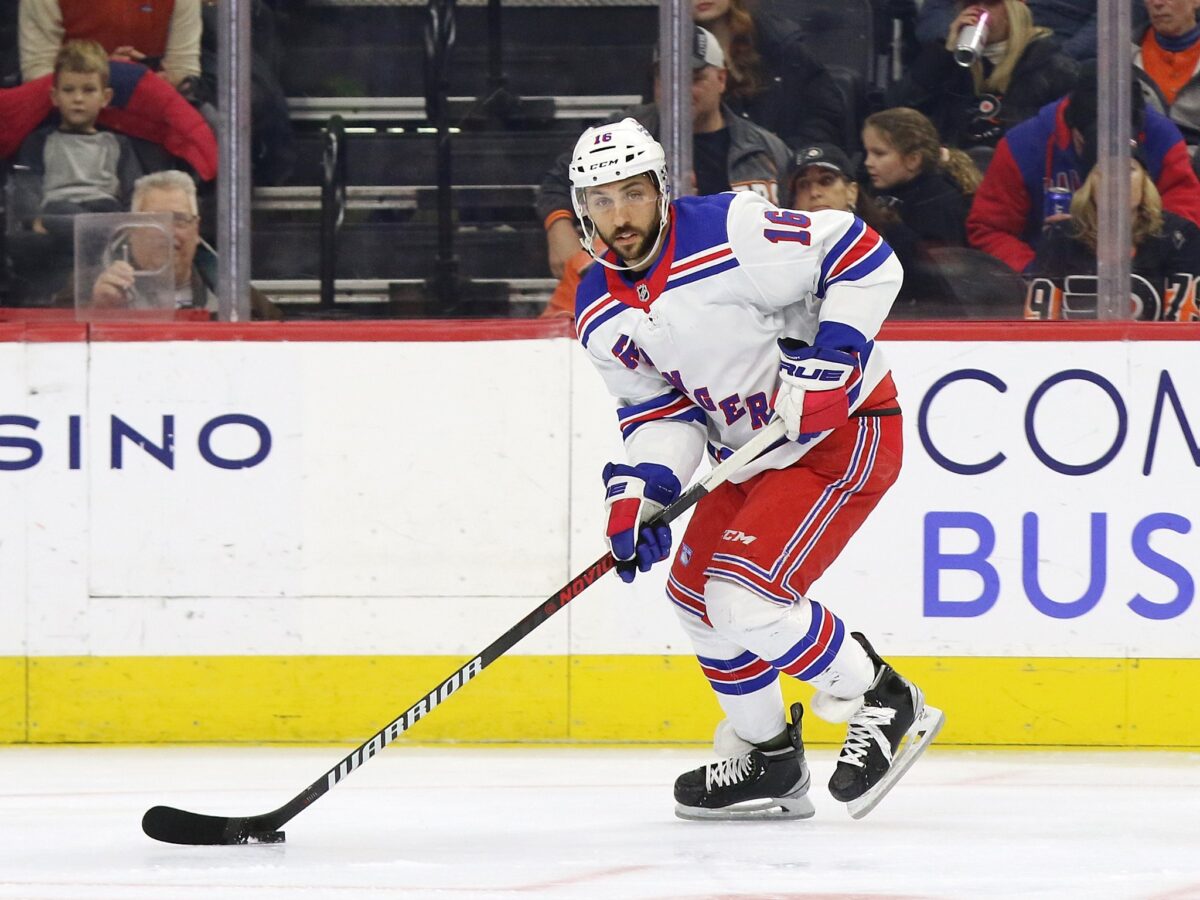Rebuilding “The Right Way” wasn’t what got the New York Rangers to where they are today.
That, of course, is preparing for the second round of the NHL playoffs after a businesslike opening sweep of the overmatched Washington Capitals, the Presidents’ Trophy winners being in their best position for a run at the Stanley Cup since also finishing with the league’s best record 30 years ago, when they captured the franchise’s first championship in 54 years.
A season in which the Blueshirts set team records with 55 wins and 114 points can be viewed as the fruit of the rebuilding project they embarked upon in February 2018, when they began the well-worn process of trading away veterans for prospects and draft picks, lowering the payroll and painstakingly accruing young, high-end talent.

Except … that’s not exactly what happened, and it’s far from the only reason why these Rangers have reached their current heights.
As important as the emphasis was on adding and bringing along kids with an eye on developing a long-term base, no moves have been more crucial to this season than the big-ticket free-agent signings of superstar winger Artemi Panarin on July 1, 2019 – barely a year after the rebuild was formally announced – and the inking of center Vincent Trocheck last summer, an acquisition that completed the core of this roster.
Panarin, Trocheck Power the Rangers’ Dynamic Offense
If the rise of a young, home-grown defense, all-world goalie and emerging former No. 1 overall draft pick forward formed the structure of the team, it’s Panarin’s Hart Trophy-worthy season and Trocheck’s masterful effort throughout 2023-24 that have been the fuel for the Rangers’ surge to the top of the NHL.
Panarin followed up his 120-point regular season with two goals, including what turned out to be the series clincher in the third period of the Rangers’ 4-2 win in Game 4 on April, and an assist against Washington. Trocheck, after a solid 2022-23 season, his first after signing with the Blueshirts on July 1, 2023, had his finest campaign with 77 points and carried it into the Caps series with three goals and three assists.
The two linemates were the Rangers’ best forwards this season. Neither came to the team in “The Right Way.”
The Blueshirts were Panarin’s choice when he was the big fish on the free-agent market five years ago, with the Rangers thrilled to give him a seven-year, $81.5 million contract with an $11.6 million average annual value that at the time was the second-largest in the league behind Connor McDavid’s. The belief from then-general manager Jeff Gorton and then-team president John Davidson – the latter of which was instrumental in recruiting Panarin after the two were part of the Columbus Blue Jackets organization – was that the left wing would provide offensive cover for youngsters during the rebuild, and then serve as a centerpiece once the club was ready to contend again.
That’s largely what’s happened. Panarin is without question the best free-agent signing in franchise history, recording 461 points in 350 regular-season games in a Blueshirt, and also one of the most successful such signings in New York sports history, making his salary seem like a bargain. He’s melded seamlessly into the city’s culture, raising his game to a level he didn’t reach in highly-successful stints with the Chicago Blackhawks and Blue Jackets.
Panarin also appears driven to erase the one part of his story that’s been substandard to the rest of his brilliance – his production during the playoffs. Having yet to dominate a postseason series the way he has in the regular season over his nine-year career, Panarin managed only two assists in last year’s seven-game first-round loss to the New Jersey Devils. Yet he was at his best and seemed unencumbered by the career-long playoff baggage in recording three points in the sweep of the Caps.
Related: Rangers Sweep Capitals to Move On to Second Round
The book on Panarin for opponents in past playoffs has been to aggressively deny him time and space, stifling the creativity that makes him so dangerous. For one series at least, it appears Panarin has overcome that approach to stopping him.
“Part of the thing right now is changing our mindset for a different kind of hockey (in the playoffs),” Panarin said of his line that includes Trocheck and 2020 No. 1 pick Alexis Lafreniere. “We have to be quick enough, because there’s not going to be that much free ice for us. We have to be ready for that. If we are, I hope things will go well.”
Trocheck is on his way to joining Panarin on that list of best Rangers free-agent pickups. Signing up for seven years and $39 million – a contract that was heavily questioned at the time for its length – the 30-year-old’s dynamic, versatile play has been everything the Blueshirts had hoped for and more. Trocheck said that playing with Panarin was a primary reason for choosing the Rangers, and after struggling to mesh with Panarin’s game at times last season, the two have been simpatico throughout 2023-24 in forging one of the NHL’s most productive forward units with Lafreniere. The Caps had no answer for Trocheck in the first round as he forged an outstanding start to the playoffs.
It’s difficult to fathom where the Rangers would be without the offense, faceoff prowess, speed, exceptional work on special teams, leadership, grit and fiery competitiveness they get from Trocheck on an every-game basis. Like Panarin, he’s been a perfect fit.
“You’re talking about a player who touches every part of our game if you think about it,” coach Peter Laviolette said. “Faceoffs, offense, defense, power play, penalty kill, 6-on-5, 5-on-6, he is one of the first players out the door. He plays high minutes, he has been reliable. He is part of one of the top lines in the league with regards to producing offense. He is someone that we count on, that I count on and rely on.”
Many Teams Rebuilding “Traditionally” Aren’t Getting Better
This isn’t how it’s supposed to work. A “Right Way” rebuild usually doesn’t rely on high-end free agents as part of the core. Those players are supposed to come from within, with draft picks and trades for future stars the most sound – and cost effective – method of building up a roster into a championship outfit. Free agents are meant to augment that core, not form it.
Right? Well, not in this case. There’s no debate over the importance of 20-somethings Lafreniere, Adam Fox, Igor Shesterkin, K’Andre Miller, Braden Schneider, Ryan Lindgren and others such as Kaapo Kakko, Will Cuylle and Matt Rempe this season – the Blueshirts’ acquired-and-developed crowd that in theory represents the long-term future as well as the present. Perhaps Filip Chytil can overcome his concussion issues and join that group.
Yet it’s Panarin and Trocheck, both into their 30s, who bring the energy and verve to the offense, generating the most chances with their relentless, varied and in Panarin’s case, unconventional style. The Rangers revolve around both players in so many ways, their lethal power play and stingy penalty kill (Trocheck) being major by-products of both players’ efforts.
“What can you say?” Trocheck said of Panarin in March. “Great player. Love playing with him.” (From ‘Artemi Panarin’s Shootout Winner Is The Latest Highlight Of a Career-Best Season’, The Athletic, 3/24/24)

In a salary-capped league, the Blueshirts aren’t about to apologize for hitting big on two signings that eat up more than $17 million of space. It’s important to note that so many teams that are “doing it right” when it comes to rebuilding – the Ottawa Senators, Buffalo Sabres, Anaheim Ducks, (former) Arizona Coyotes, Chicago Blackhawks, San Jose Sharks and others – find themselves perennially mired near the bottom of the standings.
The truth is that every team’s situation is different when it comes to properly reconstructing a roster. Adding Panarin and then Trocheck three years later has turned out to be The Right Way for a Rangers team that’s now chasing the chalice, rather than endlessly collecting young talent and trying to figure out how to mold it into a winner – which is occurring for several of the aforementioned organizations that have yet to see their rebuilds bear much fruit.
The decision by Gorton to re-sign Chris Kreider in February 2020 rather than trade him for the sake of trading him to conform with the “proper” path to a better future has also proven essential for the 2023-24 Rangers. The Blueshirts were also willing to pay up for captain and defenseman Jacob Trouba, who wanted to leave the Winnipeg Jets and was acquired by the Blueshirts in a trade in June 2019.
Panarin, Trocheck Cap Hits Will Make Re-Signing Young Players Difficult
A cynic might argue that these being the Rangers, the New York team that plays under the bright lights of Broadway, means that they don’t possess the organizational DNA to embark on an extended rebuild, so they turned to the free-agent route and in doing so, “cut corners” in the process. The results, though, can’t be argued. The club had the rare opportunity to bring in an elite star like Panarin and didn’t hesitate, and then grabbed another player in Trocheck whose game improved upon coming to the Big Apple, adding a pair of in-their-prime forwards to the rising youth that flowed through their system and into the NHL.
To be sure, the salaries of Panarin and Trocheck, along with other veterans such as Kreider, are about to get even more costly. Shesterkin, Lafreniere, Miller, etc. are on the verge of coming off bridge deals and will need to be signed long-term over the next couple of offseasons. The math to make that happen doesn’t work out at the moment, and sacrifices will have to be made – not what a front office wants to do when it develops its kids into key contributors. Panarin’s contract is paid almost entirely in signing bonuses, making it buyout-proof, and it’s not like the Rangers would do away with his massive cap hit – still among the largest in the league with two more seasons to run beyond this one – even if it wasn’t.
That’s an issue for another day. For the here and now, the Rangers are a serious threat to raise the Stanley Cup next month, thanks to a roster that was built with boldness and without pretense of having to accomplish it using some cliched formula – one that’s shown to hardly be a guarantee of future success. Anything but bought-and-paid-for mercenaries, Panarin and Trocheck have turned out to be as important as anyone who’s played a role in carrying the Blueshirts into their current era of championship contention.
